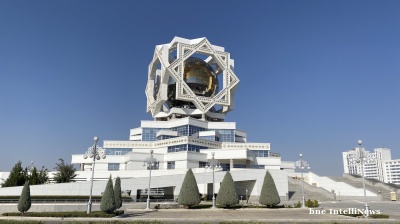Turkmen President Gurbanguly Berdymukhamedov’s son Serdar has been appointed deputy foreign minister following the whopping 91.4% of the cast vote that he officially won last week to retain his seat in Turkmenistan’s 'rubber stamp' parliament, Turkmen state-run media reported on March 31.
Serdar Berdymukhamedov, 36, was appointed "by decree of the head of state", the announcement said. The development confirms the outlook of some Turkmenistan watchers who saw the parliamentary elections as a way to elevate Serdar’s status. Turkmen citizens voted for a new parliament on March 26 in an election dominated by three parties and some independents. However, all of the candidates supported President Berdymukhamedov, thus presenting no real opposition.
Rumours about Serdar’s potential future as Turkmenistan's next president have long abounded among political analysts. Serdar has headed a parliamentary committee on legal affairs since March 2017. His recent meeting with Kazakh President Nursultan Nazarbayev at a rare summit of Central Asian leaders - his father was away on visits to Kuwait and the United Arab Emirates (UAE) attempting to raise investment for Turkmenistan, currently in the midst of an economic crisis - provided more evidence that this eventuality would occur.
Prior to meeting with Serdar, Nazarbayev met with the leaders of each Central Asian country who attended the event. Considering that the official representative assigned to the event in place of the Turkmen president was the Turkmen parliament’s chairwoman Akja Nurberdyeva, Nazarbayev’s decision to meet with Berdymuhamedov’s son instead of Nurberdyeva appeared to underline the scenario of Serdar being groomed to succeed his father, commonly referred to as Arkadag, or “protector”, and officially described as overseeing an era of “might and happiness”. Little is publicly known about Serdar, but it is established that he trained as an agricultural engineer and later studied diplomacy in Russia and Switzerland.
In January, the Washington-based Freedom House NGO assessed Turkmenistan as among the 12 “worst of the worst countries” for political freedom and civil liberties. None of the country’s previous elections have been deemed free or fair by Western monitors and Gurbanguly Berdymukhammedov, who has run the former Soviet Republic since 2007 while tolerating no dissent, won his third presidential term in February last year with 97% of the vote.
Most of the candidates in the election represented one of the three registered political parties. These are the Democratic Party of Turkmenistan (DPT, formerly the Communist Party), the Party of Industrialists and Entrepreneurs, founded in 2012, and the Agrarian Party, founded in 2014, which took part in an election for the first time. A small number of candidates were put forward by public initiative groups.
The parliamentary election took place with no sign that the country of six million’s worsening budget and economic predicament are improving. The budget woes have continuously mounted within recent months with alarm bells sounding over scarce hard currency.
The Turkmen government has adopted multiple desperate measures to rescue the country’s budget including completely suspending Visa cards; ending the era of discounted gas, water and electricity prices for citizens; making contributions to Turkmenistan’s Pension Fund by business owners mandatory from 1 January; and even imposing more fines on car owners and Turkmen fortune tellers, whose occult services are popular in Turkmenistan.
President Berdimuhamedov's trip to the Middle East secured a number of agreements, largely with the UAE. The Kuwait part of the tour did not appear to bear much fruit.
Officially reported Turkmen growth in 2017 stood at 6.5%, although the real state of the Turkmen economy is likely worse than in recent years, as continuous reports about the depleted Turkmen budget have shown. The impact of low oil prices has taken a damaging toll on the monetary value of Turkmenistan's gas and oil exports, while a row over historical debts with Iran shut off one gas export route. That left the country with China as its sole major gas customer via a new pipeline, with Russia having stopped purchases of Turkmen gas in 2016.
A more optimistic assessment of Turkmenistan was lately issued by the International Monetary Fund (IMF). Following an IMF visit to the country at the beginning of March, it said that Turkmen growth was “supported by rising natural gas exports, import substitution, and expansionary credit policies”.
News

Russia floats missile supplies to Maduro as US pressure mounts
A prominent Russian lawmaker has suggested that Moscow could supply Venezuela with advanced weapons systems, including the new Oreshnik ballistic missile, as Caracas desperately seeks military assistance amid the escalating US military build-up.

Guinea’s Doumbouya enters presidential race with major opposition parties excluded
Guinea’s junta leader Mamadi Doumbouya has entered the December 28 presidential race under a new constitution that allows members of the transition government to stand and extends presidential terms.

Russia closing the trap as its forces expand control of Pokrovsk
The stronghold city of Pokrovsk in the heart of the Donbas now risks “becoming a graveyard for Ukraine’s finest,” Euromaidan Press reports as Russian forces expand their control and threaten to encircle hundreds of Ukraine’s best troops.

Czech election winner Babiš signs coalition agreement with SPD and Motorists
ANO and its partners are poised to form the most rightwing cabinet in the country’s history.




